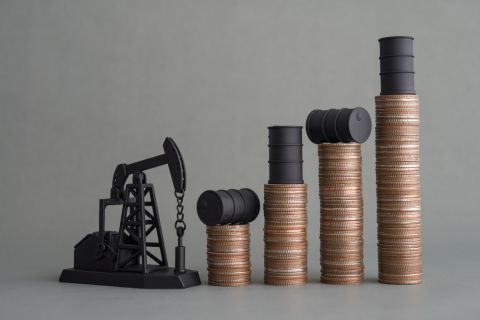By Hannah Mumby, Evaluate Energy
As Hassan Rouhani replaces Mahoud Ahmadinejad as the president of Iran, on the promise of a reform agenda that includes greater nuclear transparency, there is a sense of optimism.
The damaging UN sanctions against the Iranian state that were initially imposed in 2006 in response to Iran’s nuclear enrichment program could be lifted and lead to increased oil and gas production. Iran’s oil and gas output hasn’t grown at the pace of its Middle East peers (Iraq, Kuwait, Qatar, Saudi Arabia, and UAE) during the period of the UN sanctions. As a group, production in 2012 versus 2006 – when the sanctions were imposed – has grown by 25%, making Iran’s 4% increase seem miserly. This graph shows that Iran is the only country in our peer group to have suffered a fall in total oil and gas production since 2011.
When you compare Iran to its peers in the Middle East you can see the greater impact of sanctions. As mentioned above, Iran has only grown output by 4% since 2006 whereas all but one of its peers experienced double digit growth. Qatar has been the star performer as they have grown output by 119%.
During Mahoud Ahmadinejad’s tenure, Iran was subjected to further governmental and multinational agency sanctions, which are still in force today. The UN sanctions in response to Iran’s nuclear enrichment program included the ban on investment in the oil, gas, and petrochemicals industry and the export of petroleum products. At first the sanctions didn’t seem to have any effect on Iran’s oil and gas production but as this graph demonstrates, output has dropped significantly in 2012 in comparison to the previous year. The 2012 boost in gas production (6%) is unable compensate for substantial drop in oil production (15.6%). In real terms this drop in oil production equates to a total of 678,000 b/d, assuming an oil price of US $95/bbl that would represent a fall in revenue of approximately $23 billion.
In fact, as you can see from the two graphs below, the 6% gas production increase was necessary to keep up with demand, as consumption levels in the country continued to grow. This year was actually only the second year in the last fifteen in which Iran did not have a gas deficit. Oil production falling therefore is a hit on the only exportable hydrocarbons Iran has.
 Source: Evaluate Energy
Source: Evaluate Energy
 Source: Evaluate Energy
Most western leaders have welcomed the election of Mr Rouhani who has already expressed his wish for Iran to engage with and improve its relationship with the west, and in return wants to see the “unfair” sanctions rescinded with a view to improving Iran’s production levels and boost the economy. On Monday, Rouhani said “Our nuclear programs are completely transparent, but we are ready to show greater transparency and make clear for the whole world that the steps of the Islamic Republic of Iran are completely within international frameworks.”
There hasn’t been this much openness to change from an Iran leader since the previous reformist Mohammad Khatami was president between 1997 and 2005. His time in power was, however, restricted by Supreme Leader Ayatollah Ali Khamenei and the Supreme National Security Council. Only time will tell whether the optimism surrounding the election of Rouhani is indeed well placed and if he will have the positive effect on production levels that Iran needs, or if in fact history repeats itself and the supreme powers that be create another stalemate.
Source: Evaluate Energy
Most western leaders have welcomed the election of Mr Rouhani who has already expressed his wish for Iran to engage with and improve its relationship with the west, and in return wants to see the “unfair” sanctions rescinded with a view to improving Iran’s production levels and boost the economy. On Monday, Rouhani said “Our nuclear programs are completely transparent, but we are ready to show greater transparency and make clear for the whole world that the steps of the Islamic Republic of Iran are completely within international frameworks.”
There hasn’t been this much openness to change from an Iran leader since the previous reformist Mohammad Khatami was president between 1997 and 2005. His time in power was, however, restricted by Supreme Leader Ayatollah Ali Khamenei and the Supreme National Security Council. Only time will tell whether the optimism surrounding the election of Rouhani is indeed well placed and if he will have the positive effect on production levels that Iran needs, or if in fact history repeats itself and the supreme powers that be create another stalemate.
Recommended Reading
Texas LNG Export Plant Signs Additional Offtake Deal With EQT
2024-04-23 - Glenfarne Group LLC's proposed Texas LNG export plant in Brownsville has signed an additional tolling agreement with EQT Corp. to provide natural gas liquefaction services of an additional 1.5 mtpa over 20 years.
US Refiners to Face Tighter Heavy Spreads this Summer TPH
2024-04-22 - Tudor, Pickering, Holt and Co. (TPH) expects fairly tight heavy crude discounts in the U.S. this summer and beyond owing to lower imports of Canadian, Mexican and Venezuelan crudes.
What's Affecting Oil Prices This Week? (April 22, 2024)
2024-04-22 - Stratas Advisors predict that despite geopolitical tensions, the oil supply will not be disrupted, even with the U.S. House of Representatives inserting sanctions on Iran’s oil exports.
Association: Monthly Texas Upstream Jobs Show Most Growth in Decade
2024-04-22 - Since the COVID-19 pandemic, the oil and gas industry has added 39,500 upstream jobs in Texas, with take home pay averaging $124,000 in 2023.
Shipping Industry Urges UN to Protect Vessels After Iran Seizure
2024-04-19 - Merchant ships and seafarers are increasingly in peril at sea as attacks escalate in the Middle East.



